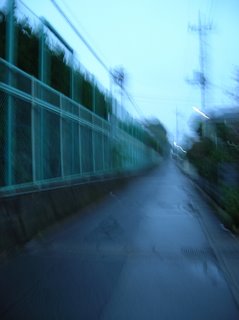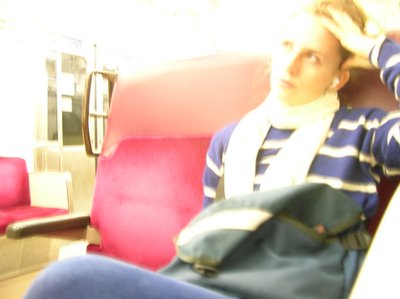
When I was a little girl, my mother used to take me and my sister Amy to the public swimming pool near our home. Summers in the Midwest can be painfully hot, so I always looked forward to splashing about in the kiddie pool or taking a run down the waterslide. I loved nearly everything about the public pool: the hot, scratchy pavement on my bare feet, the smell of giant pretzels and cherry coke wafting from the concession stand, and the relief of dipping my sweaty body into cool chlorine blue. The joy of the public pool was only shadowed by one factor: the locker room. Before and after enjoying the splendors of public bathing, I would have to pass through the smelly and dimly lit chamber of naked middle-aged women. They were just ordinary ladies, many just like my mother accompanying small children, but to me these women seemed terrifying. There was something unsettling about seeing a fully naked adult woman. Of course, I had seen my own mother nude and thought it was quite natural, but as the strange women of the public pool locker room stripped off their wet bathing suits, I found myself wondering, “Have they no shame? Don’t they care that I can see them NAKED?” Ladies who seemed so sophisticated in their chic summer dresses would instantly transform into fleshy animals.
Modestly, I would change in the private changing stalls.
I’m not sure when or why I got over my aversion to locker room nudity. While in University, I joined a gym, and thought little of changing and showering in front of so many strangers. They were just strangers; why should they care about me?
I began to feel like being comfortable with my own nudity was a mark of adulthood. We even use the term “adult” to refer to things related to nudity. This validated my sense of maturity*.
*another term denoting nudity

This past weekend my friend Mami organized a group trip of sorts to a small town north of Nikko that is famous for onsen, or Japanese-style public bath. There is a high frequency of natural hot springs in the Nikko mountain area, making it a popular resort destination for city slickers from Tokyo (and the less-slick from Utsunomiya). Our group, consisting of a mix of Japanese and gaijin, met downtown on Saturday afternoon, then caravanned up the winding and stunningly picturesque road to the onsen. After checking into our hotel and being shown our three washitsu, we assembled and the boys’ room, sipping oolong tea and taking turns introducing ourselves. (Mami was the only one who knew everybody.)
Dinner was served in another private dining room, where we each had our own small table laden with a variety of colorful (and sometimes unrecognizable) foods.

To get into the party spirit, we had all agreed to change into the yukata, or cotton robes, provided by the hotel. Sitting in two opposite rows in the massive washitsu, we looked like a strange conglomeration of business associates in matching pajamas.
The beer, whisky, and sake which flowed liberally soon served to ease any nervous dispositions, and before long the two gaijin boys were singing the “Whole New World” Aladdin duet while the rest of us reclined to the romantic ballad.
My favorite routine was Queen’s “Champions,” which was performed by an unassuming Japanese medical student with a hidden talent (and passion) for singing classic 80’s tunes.
The karaoke-booze-pajama revelry carried on for several hours, until we had all either humiliated ourselves or amassed a private fan club or both.

And just when we all thought the fun had reached an all-time high, we commenced the activity that we had all (secretly and openly) been pining for all day: public bathing.
Japanese onsen, though essentially just large, public bathtubs, have a meditative, purifying atmosphere that serves to usher the bather into a semi-conscious state of bliss. The onsen at our hotel was gender-segregated (though not all are in Japan), and when our quartet of girls reached the 11th floor suite of bathtubs overlooking the town, we were nearly the only bathers. And by the time we stripped down, had the mandatory pre-bath shower, and splashed into the bath, we had frightened away the several older Japanese ladies who lingered. (The Japanese word for cute is “kawaai.” “Kwaai” means scary. Funny how fast a gijiin can drop the extra “a” with the removal of a few pieces of clothing.)
We soaked, splashed, fashioned our bathing towels like nuns’ habits and brides’ veils, and, inspired by an enthusiastic performance during karaoke, even sang a few reprises of the Little Mermaid’s “Part of Their World.” I never knew you could have so much wholesome fun in the nude.
The fun couldn’t last forever, though, and like a gang of pink raisins, we reluctantly got out and dried off, returning downstairs to reunite with the boys.
The next morning was clear and crisp, a perfect opportunity to visit the outdoor onsen located behind the hotel, overlooking the river. We scurried down after breakfast, and found the small bath empty and inviting. Tired from an intense tournament of ping-pong the night before, we didn’t talk much as we soaked in the steaming waters. I think more than one of us may have fallen asleep to the soothing sound of the river running over the rocks below. We had been soaking for perhaps a half an hour when we were joined by a woman and two young girls.
The girls were about 7 or 8 years old, and while it was unclear if they were sisters, they were certainly very close. As they huddled together in the bath next to us, they counseled each other on the safety of playing near the river below. I don’t speak Japanese, so I had to rely on Mari for a translation, but it seemed that some of their conversation was also about us. Mari later confirmed my suspicion.
Seeing the two girls in the onsen reminded me of the old summer days at the public pool. Amy and I would exchange glances of support and horror as we watched strangers undress immodestly in the chlorine-scented locker room. And, much like the two girls at the onsen, I now realize we were probably less than discreet about our observations. As an adult, I can see the irony of my obsession with modesty paired with my disregard for courtesy. After all, isn’t true modesty an expression of courtesy? If so, proper onsen etiquette requires comfort in nudity; my nakedness is simply a demonstration of my propriety.
I am continually discovering interesting and wonderful elements of Japanese culture. My newest, and certainly one of my favorite, Japanese customs is the tradition of public bathing. There is something to be said of a culture that has made public nudity an element of polite society. It’s a relief to discover that sometimes, the most sophisticated thing to wear is nothing at all.

 Tuesday morning, I woke up to the sound of the wind rattling my front door, and could almost feel the draft through my thin walls. I must have hit the snooze button on my small plastic alarm clock four or five times; the tapping of the rain against the windowpane urged me not to climb out of my cozy futon. When I finally did get up and draw back the curtains, I felt like I was looking out on the deck of a ship at sea, not my courtyard. The rain coming down in sheets was moving horizontally, matching the branches of the trees and bushes as they were pulled by the wind. In my groggy morning thoughts, the only thing that could solidify was “Maybe there’s such a thing as a rain day. I can’t possibly be expected to ride my bicycle to work in this.”
Tuesday morning, I woke up to the sound of the wind rattling my front door, and could almost feel the draft through my thin walls. I must have hit the snooze button on my small plastic alarm clock four or five times; the tapping of the rain against the windowpane urged me not to climb out of my cozy futon. When I finally did get up and draw back the curtains, I felt like I was looking out on the deck of a ship at sea, not my courtyard. The rain coming down in sheets was moving horizontally, matching the branches of the trees and bushes as they were pulled by the wind. In my groggy morning thoughts, the only thing that could solidify was “Maybe there’s such a thing as a rain day. I can’t possibly be expected to ride my bicycle to work in this.”






